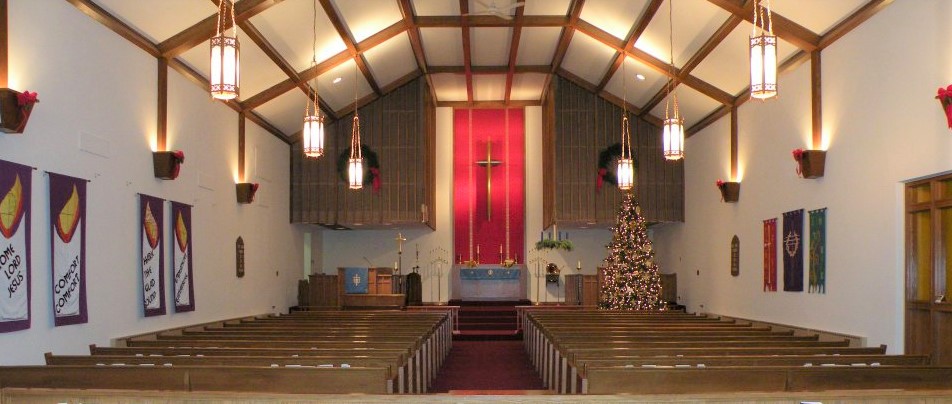August 9 2020 Sermon
P10A 2020: Matthew 14:22-33 & 1 Kings 19:9-18
The story of Jesus walking on water is so often referenced in popular culture that
you don’t have to be biblically literate to know about it. And bible stories that familiar
always pose the challenge of making us preachers feel like we need to come up with
something revolutionary and new to say about them; I’ll warn you that that’s not about to
happen. Yet I remember being at a chapel service years ago where one of my professors
claimed that in his church when he was growing up, his pastor only ever preached on one
of two bible stories, and this was one. I don’t remember the point of my professor’s
sermon, or whether he even told us the point of his pastor’s sermon, I just remember him
saying that after years of hearing this miraculous story so many times that it bored him to
tears, he used to go to church praying, “This week just let Peter stay in the boat!”
Both the gospel and the thematic Old Testament reading for today show us great
figures in the history of God’s salvation narrative. Elijah lives in the collective memory
of Israel as the greatest of the prophets; having never died but having been taken up to
heaven in a fiery chariot, it became tradition for God’s people to anticipate his return.
Peter gets a ton of attention in the gospels, though not all of it is good; yet in the end
Jesus promises that Peter is the rock on whom the church will be built; St. Peter is
celebrated as the first bishop of Rome, or in other words, the first pope. Both Peter and
Elijah are towering figures of the faith. But, stick with me here, today’s stories are not
about them.
We could point out that both Elijah and Peter give us hope as complicated biblical
characters. Peter seems to get it wrong as often as he gets it right but Jesus still calls him
to important work anyway, giving us hope that our own failures don’t rule out our role in
the work of the kingdom. Elijah’s story is sort of the opposite: he accomplishes miracles
and fights the enemies of the faith but then ends up being overcome by fear; today’s story
recounts how even after the Lord visits him personally, Elijah remains unchanged in his
disillusion and is graciously dismissed from his mission as a prophet, showing us that
even those who have incredible religious experiences may suffer the same doubts and
fears that we do. But the primary purpose of scripture is really not to give us a catalogue
of characters to choose as our role models or even to give us the encouragement of
knowing that other imperfect people still had a part to play in the unfolding drama of
God’s love story for the world. The primary purpose of these stories is to reveal to us the
character of the God who created us and redeemed us and sustains a loving relationship
with us.
In 1 Kings, Elijah is hiding out, tired, fearful, discouraged, no longer able to
accurately evaluate his own circumstances for his frustration. Not in wind, fire, or
earthquake, but in the still sound of sheer silence God faithfully pursues Elijah to his
mountain hideout. And even though Elijah’s response after God shows up is, word for
word, the same as his complaint before God visits him, even though Elijah has not
changed or progressed and is ready to abandon his work as a prophet, God still remains
faithful to Elijah, speaking to him, caring for him, and providing for his needs. It was not
in silence but in the midst of the strong wind and the battering waves that Jesus
approaches Peter and the disciples. Even though Peter getting out of the boat is every bit
as foolish as it is faithful, still Jesus doesn’t let him sink; Matthew says that Jesus
immediately reaches out to catch Peter, even as he wonders aloud why Peter doubted.
Again God is faithful, even when we are not.
It is hard to believe that this is the first time we have gathered in person in any way
for five months. And we are not out of the woods yet. It will be months more that we
struggle with the threat of illness, with disrupted lives, with limited community. Our
society, our institutions, our economy, our church were not built to weather the storm in
which we find ourselves. So we’re going to make some valiant efforts, and we’re going
to mess up some of our responses, and we’re going to get frustrated, and sometimes
we’re going to be stubborn, and once in a while we’re going to feel like we’re about to
sink. And that’s why we literally thank God that it’s not about us.
These stories, all the biblical stories, show us that no matter what the
circumstances, whether we’re on top of a mountain or sinking towards the bottom of the
sea, whether we’re in calm or in chaos, whether we’re being fearful, being foolish, or
being faithful, the One who is truly faithful isn’t us—it’s God. For the steadfast
lovingkindness of the Lord, a faithfulness that never fails and a love that never ends, may
we be truly thankful

